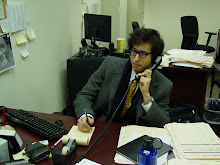Automotive High and the Crumbling Auto Industry
Jun 11, 2009
By Aaron Short
At the beginning of the school year, seniors in Chris Rinaldi’s economics class at Automotive High School thought they had a fairly typical year ahead of them and decent job opportunities awaiting them upon graduation. Oil prices were low, the market was booming, and there were encouraging signs that auto companies were redirecting themselves out of a financial tailspin.
What a difference a year makes. Two of the Big Three American automakers have gone bankrupt, the housing bubble has crashed leading to high foreclosure rates, and unemployment nationwide is 9.4 percent (state unemployment levels are hovering around 8 percent).
“We started out our lessons on personal finance, but this has been a gift,” said Rinaldi. “It really has been a teachable moment.”
I visited Automotive High School recently to ask several of Rinaldi’s seniors what they thought about the financial crisis and the possible collapse of the auto industry, and its effect on their job prospects for the future. In the process, I learned some unexpected lessons from three very thoughtful seniors, John Mitchell, Melchi Laurent, and Adam Scott. Laurent and Scott are looking to attend four year college programs, Laurent at SUNY-Canton, and Scott in an accounting program at Kingsboro Community College. Mitchell is hoping to work for an auto mechanic shop or work for his dad in the construction industry. If those fall through, he might apply for a job in retail.
“A lot of people are just going out to find any kind of job,” said Mitchell. “I was in the Bronx and I walked by BJs which had a ‘Now Hiring’ sign. The line stretched around the block.”
The recession is not just a school lesson. Mechanic jobs in dealerships that pay as much as $18 an hour are disappearing. So are a number of small auto shops citywide, forcing many Automotive seniors to rethink their professional plans. The sight of foreclosures on their blocks and in their neighborhoods as the housing bubble began to deflate adds another level of pressure and insecurity to these teenagers’ daily lives.
“I think it’s the banks’ fault and the credit cards’ fault,” said Laurent. “You see people getting evicted, beds outside my neighborhood. One month I saw a home for sale and people moving into it, and the next month you see an eviction sign on its property.”
Automotive High School is a refuge for these seniors, who are learning real skills that can lead to jobs with the NYPD, New York City Transit, and other city agencies, as well as auto mechanic shops and remaining dealerships. The students are broken into two tracts: auto business or auto shop, where they learn the fundamentals of running their own business and the technical expertise to diagnose and fix automobiles. There is even a working mechanic shop in the back of the high school where teachers often bring their vehicles for inspections and repairs.
In September, Automotive will institute a new mechanical engineering program designed to encourage students to explore a career path in engineering and the sciences. “A lot of students are interested in engineering and some do study it after high school,” said Automotive Assistant Principal Paul Heymont. “The students will learn a broad range of skills in how to assess a situation, why things happen, and what you have to do to change them.”
New York Times columnist Tom Freedman often writes about the green economy and the need for more applied science training among the next generation of students. If Automotive High School can continue to encourage its students to explore their interests in engineering and the applied sciences, they will be in better shape to launch their careers into the green economy and even lead the country out of its current recession. Now, wouldn’t that be a teachable moment?
Thursday, June 11, 2009
Subscribe to:
Post Comments (Atom)


No comments:
Post a Comment